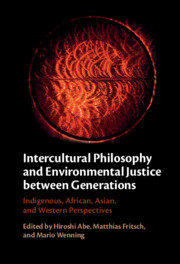 Intercultural Philosophy and Environmental Justice between Generations
Intercultural Philosophy and Environmental Justice between Generations Book contents
- Intercultural Philosophy and Environmental Justice between Generations
- Intercultural Philosophy and Environmental Justice between Generations
- Copyright page
- Contents
- Contributors
- Acknowledgments
- Introduction
- Part I Indigenous Philosophies on Justice between Generations
- 1 Indigenous Philosophy and Intergenerational Justice
- 2 Climate Ethics and Intergenerational Reciprocity in Indigenous Philosophies
- 3 Intergenerational Justice and the Environment in Africa
- 4 Reasonabilism, Homeostasis and Intergenerational Justice in African Thought
- Part II Intergenerational Ethics in Dialogue with Confucianism and Daoism
- Part III Humanity Facing the Near Environmental Future
- Index
- References
4 - Reasonabilism, Homeostasis and Intergenerational Justice in African Thought
from Part I - Indigenous Philosophies on Justice between Generations
Published online by Cambridge University Press: 14 March 2024
- Intercultural Philosophy and Environmental Justice between Generations
- Intercultural Philosophy and Environmental Justice between Generations
- Copyright page
- Contents
- Contributors
- Acknowledgments
- Introduction
- Part I Indigenous Philosophies on Justice between Generations
- 1 Indigenous Philosophy and Intergenerational Justice
- 2 Climate Ethics and Intergenerational Reciprocity in Indigenous Philosophies
- 3 Intergenerational Justice and the Environment in Africa
- 4 Reasonabilism, Homeostasis and Intergenerational Justice in African Thought
- Part II Intergenerational Ethics in Dialogue with Confucianism and Daoism
- Part III Humanity Facing the Near Environmental Future
- Index
- References
Summary
This paper revisits the concept of reasonabilism, which subsumes a form of reconfiguration of an holistic conception of consciousness in a manner that ties contingent rational expressions or the principle of consistency to corresponding enabling sets of affectivities and conatus (degrees of beneficence or their negation as contained in volitional states) and vice versa, such that they become two sides of the same coin. The paper explores the basis of reasonability and reasonabilism in African thought, showing that African thought is not as long on the formal radial scale as it is deep on the substantive relational scale, including the relationalities and sociality of pure consciousness (self-reflecting intensionality, its representations and levels of reality) and the implications of these for the scale and depth of conceptions of justice, especially intergenerational justice as it relates to the environment and development generally. Contemporary Africa faces the challenge of retaining and deepening the conatal depth of beneficence in its Indigenous philosophical resources and heritage while expanding its radial of consistency to meet the global challenges of looming environmental disaster and the question of environmental sustainability, poverty, disease, etc. This paper also tries to point towards the necessary reconceptualization and reinvigorations that would further enrich African thought along the required lines.
Keywords
- Type
- Chapter
- Information
- Intercultural Philosophy and Environmental Justice between GenerationsIndigenous, African, Asian, and Western Perspectives, pp. 75 - 94Publisher: Cambridge University PressPrint publication year: 2024
